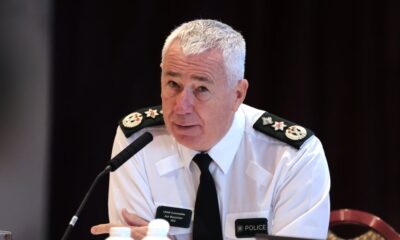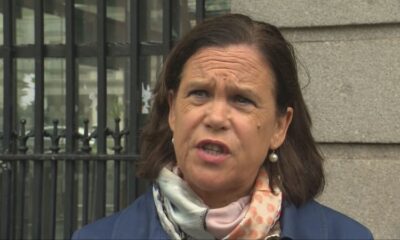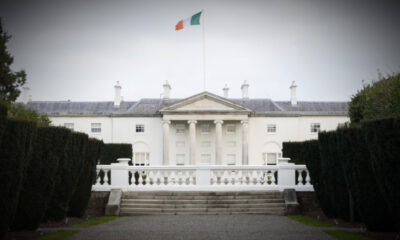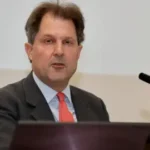Breaking News
Eight journalists unlawfully spied upon by PSNI – review
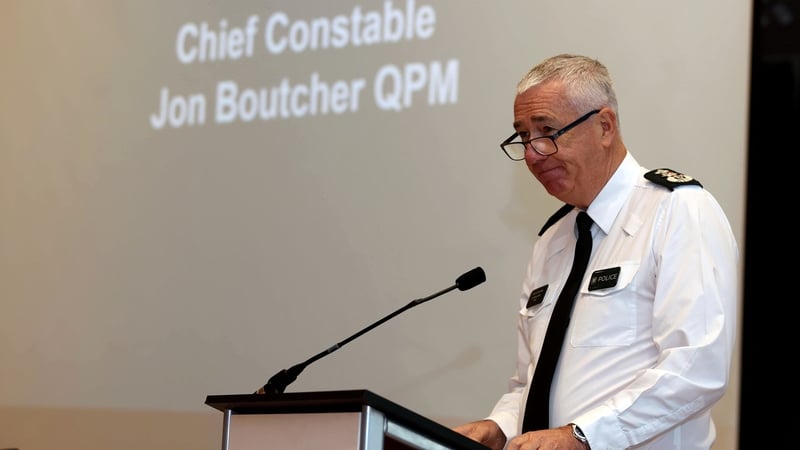
This post was originally published on this site.
An independent review has revealed there were 21 instances whereby eight journalists were unlawfully spied upon by the Police Service of Northern Ireland in an attempt to reveal their sources.
The review identified various other concerns about the police surveillance of journalists, lawyers and other groups in Northern Ireland.
These concerns relate to inconsistencies in standards of processing, record-keeping and the management of confidential or privileged information.
However, the McCullough Review also found that there is no basis for concerns that the PSNI surveillance of journalists or lawyers is “widespread or systemic”.
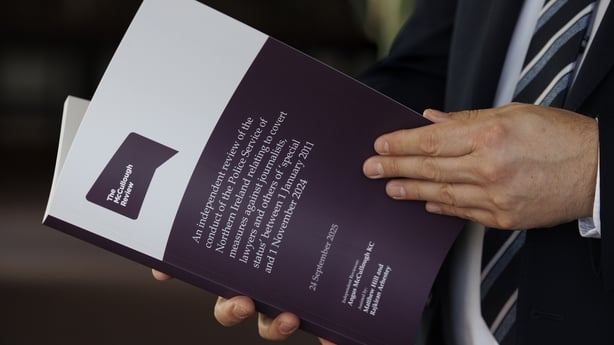
The review made a series recommendations to Chief Constable of the PSNI Jon Boutcher, with the aim of addressing the concerns it identified alongside improving the PSNI’s surveillance practices in the relevant areas.
The McCullough Review examined the use of surveillance by the PSNI against certain groups and people between 2011 and last November.
This included journalists, lawyers and non-governmental organisations (NGOs) as well as regulators, such as the Police Ombudsman for Northern Ireland and the Northern Ireland Policing Board.
Journalists, lawyers and other groups are deemed to have “special status” under surveillance legislation arising from material disclosed in ongoing Investigatory Powers Tribunal (IPT) proceedings.
The PSNI has faced pressure following remarks that the use of its surveillance techniques breached the principles of press freedom and legal privilege.
As a result, the Chief Constable of the PSNI asked Angus McCullough KC to carry out an independent review in the public interest last year, aiming to enhancing public confidence in policing in Northern Ireland.
Mr Boutcher has published the main 200-page report drafted by the McCullough Review, including its findings and recommendations.
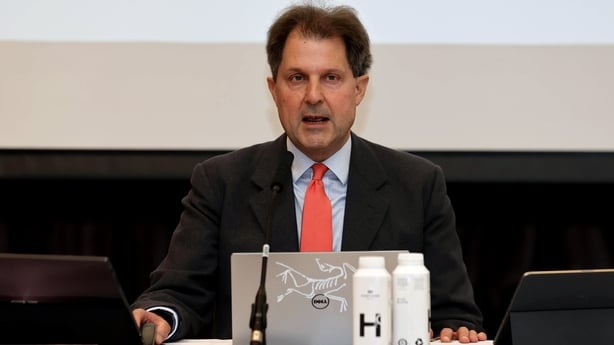
The Chief Constable and Mr McCullough will address the media at a press conference in Belfast this afternoon.
Mr McCullough, a senior barrister based in London, said he was afforded unrestricted and unsupervised access to all police systems and records as well as serving PSNI officers and staff.
He said the process involved in carrying out the review included “painstaking searches of systems” – many of which have limited search capabilities.
In the report, Mr McCullough expressed “profound reservations” about the PSNI’s Professional Standards Department routinely “washing through” a lengthy list of journalist’s telephone numbers to check against the PSNI’s records.
This practice was employed with the intention of identifying unauthorised contact between PSNI officers or PSNI employees and journalists.
The review found the practice does not appear to have been “necessary, or proportionate, or indeed compatible with the rights of journalists whose personal data was being processed in this way”.
It notes that this “washing through” of journalists’ contacts was formally discontinued in May 2024.
The review also states that while it makes criticisms, there are “far more numerous examples of careful and considered practice” by the PSNI in full accordance with the applicable legal framework and its safeguards.
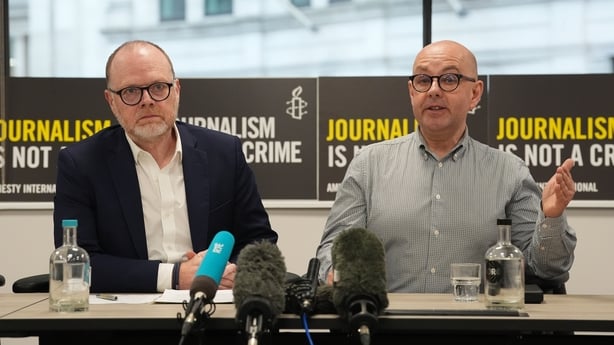
A previous report in June 2024 from Mr Boutcher to the Northern Ireland Policing Board identified 323 surveillance applications “relating to journalist”.
The McCullough Review revised this figure upwards to 378 applications.
Of which, it views 21 as being considered unlawful attempts to identify eight journalists’ sources.
One of the journalists is Barry McCaffrey, who along with Trevor Birney, the report said “have brought to light a succession of breaches by the PSNI as found by the High Court and in the IPT, including unlawful directed surveillance of a suspected journalist source”.
Last December, the IPT quashed the decision, made by former PSNI chief constable George Hamilton, to approve the Directed Surveillance Authorisation (DSA) in an investigation into the leaking of a confidential document that appeared in a documentary on a Troubles massacre.
The tribunal also awarded damages of £4,000 each to Mr McCaffrey and Mr Birney in its judgment.
Mr Boutcher took over as the PSNI’s Chief Constable in November 2023.
Earlier this year, he referred allegations that the PSNI spied on a journalist working on a documentary about the death of a teenage schoolboy in Northern Ireland to the McCullough Review.
The PSNI had denied the claims and also rejected a suggestion that it may have been behind a break-in to a car belonging to Donal MacIntyre at Heathrow Airport in October 2024.
At the time, Mr MacIntyre was working on a book and a crowd-funded documentary about the death of 14-year-old Noah Donohoe.
While the PSNI did conduct a review of Mr MacIntyre’s public posts on social media platform X, the McCullough Review has found there was no indication that Mr MacIntyre’s private communications between him and Noah’s mother had been accessed, nor that the PSNI had any involvement in a break-in to his car when it was parked in a long-stay carpark at Heathrow Airport.
The June 2024 report, from Mr Boutcher, also said there had been no use of directed surveillance against journalists and lawyers during the view period.
However, Mr McCullough said that this has been shown in the work of his review to be “incorrect”.
The report states the review found two DSAs both relating to the same lawyer, “who was apparently reasonably suspected of involvement in serious criminal activity”.
Mr McCullough said his “main concern” is that surveillance was conducted within a court building in the course of the DSA.
The McCullough Review makes a total of 16 recommendations, including that the PSNI should be required to seek legal advice before carrying out a covert investigation related to a journalist or news media organisation and that as a “matter of urgency” all relevant PSNI officers should receive mandatory training on confidential and sensitive information.
Mr McCullough also “considers it advisable” to revisit the findings and conclusions he makes in the report once ongoing IPT proceedings have been determined.
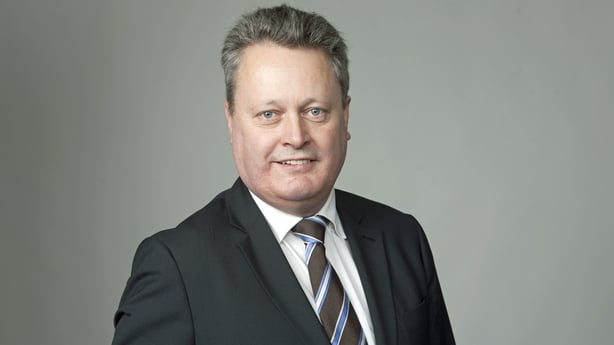
Mr Kearney, who is now RTÉ’s Northern Editor, worked for the BBC at the time as Home Affairs Correspondent.
Last year, the BBC wrote to the IPT about alleged PSNI surveillance of phone data linked to Mr Kearney’s work at the time.
However, the McCullough Review does not refer to Mr Kearney due to ongoing IPT proceedings.
A group of experts and stakeholders was also previously formed to advise and provide direction to the review.
Its members include Human Rights Advisor to the Northern Ireland Policing Board John Wadham, the first police ombudsman for Northern Ireland Nuala O’Loan, and barrister and human rights campaigner Martha Spurrier.
The group also includes representatives from the following bodies: Amnesty International UK, the National Union of Journalists, the Northern Ireland Human Rights Commission, the Law Society of Northern Ireland and the Committee on the Administration of Justice Northern Ireland.
Breaking News
McDonald ‘very concerned’ for those on Gaza aid flotilla
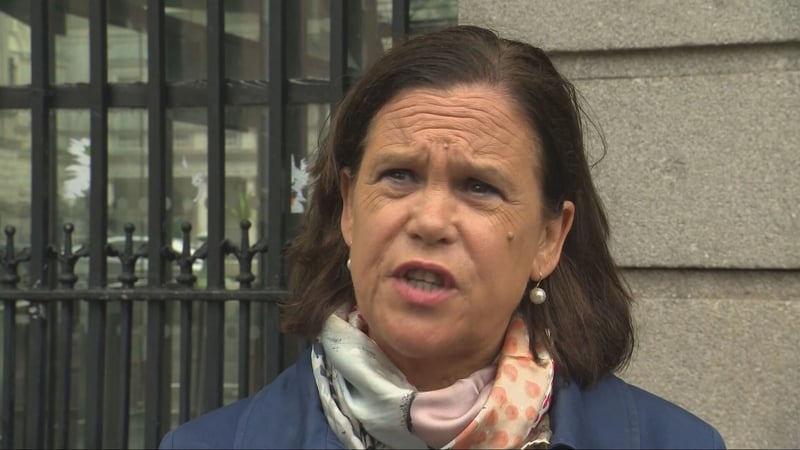
Read more on post.
Sinn Féin leader Mary Lou McDonald has said she is “very concerned” for the safety of those travelling on the Gaza-bound aid flotilla.
It comes as organisers of the flotilla as well as a number of Irish and international pro-Palestinian activists said they heard explosions and saw multiple drones target some of their boats.
Speaking to RTÉ News, Ms McDonald said: “There are more than 20 civilians, Irish citizens on the flotilla, including our colleague Chris Andrews.”
“There is no doubt that the Israeli targeting of the flotilla defies international law,” she said.
“They are acts of intimidation and menace.”
The Global Sumud Flotilla (GSF) departed Barcelona on 31 August, with the aim of breaking Israel’s blockade of Gaza. It currently numbers 51 vessels, most of which are off the Greek island of Crete.
It had already been targeted in two suspected drone attacks in Tunisia, where its boat had been anchored before resuming its voyage towards Gaza.
Ms McDonald added it is “absolutely essential that the Irish Government and others confront Netanyahu and confront Israel”.
“They believe they can act any way they wish because that has been allowed,” she said.
“The security of people on the flotilla needs to be guaranteed.”
She said she has been speaking to Senator Andrews and “his concern is for the wider safety of the flotilla and for people in Gaza who are suffering unspeakable horror”.
Speaking at a protest outside Leinster House, Ms McDonald said governments needs to show “the red card” to Israel. She said sanctions on the country are “needed now”.
“This has gone on too long,” said Ms McDonald.
“We face sure catastrophe and the extermination of the Palestinian people.”
Senator Andrews, who is on board the ship ‘The Sceptre’, said it was struck four times by drones.
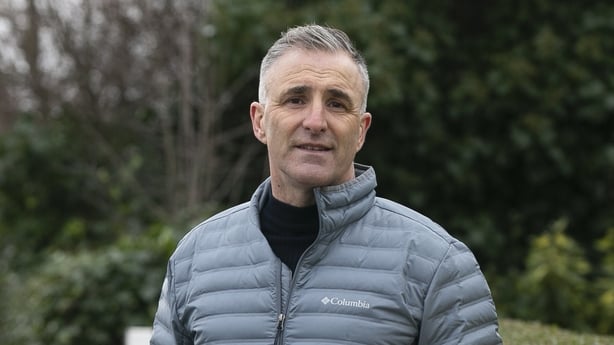
He said there were no injuries or serious damage inflicted, and that those on board remain undeterred.
Senator Andrews called for the Irish Government to “arrange for an observer vessel to accompany the flotilla to ensure that Israel does not violate the human rights of its participants”.
“This is the most serious assault by Israel on this flotilla since it first departed from Barcelona over three weeks ago.
Read more: Italy sends navy assistance after Gaza flotilla attack
“The Irish Government has a responsibility to protect its citizens on this flotilla, as well as to stand up for human rights and justice,” he said.
Senator Andrews said the Irish Government needs to “publicly challenge the dangerous and blatantly false attempts by Israel to misrepresent the purpose of this flotilla as anything other than non-violent and humanitarian in nature”.
“Ireland needs to stand up to these threats and say clearly to the world that Israel’s weapons of war will not deter humanity,” he said.
“I urge people at home to contact the Department of Foreign Affairs, the Taoiseach, the Tánaiste, and their local public representatives to call on them to intervene to protect this flotilla.”
Lynn Boylan to write to EU commission
Sinn Féin MEP Lynn Boylan said she will write to the EU commission to demand they call for safe passage of the flotilla.
“The EU must not stand idly by while innocent civilians are put in danger by doing what the EU hasn’t had the courage to do,” the Dublin MEP said.
“I would also urge everyone to contact the Department of Foreign Affairs and urge them to intervene to protect the many Irish citizens, as well as all other civilians travelling as part of this peaceful flotilla,” she added.
People Before Profit TD Paul Murphy wrote on X: “The #GlobalSumudFlotilla is under attack from Israel in international waters right now. Multiple boats reporting attacks by drones. Contact the government. Demand they send an observer to the flotilla.”
Israel, which blocked two previous attempts by activists to reach Gaza by sea in June and July, said Monday it would not allow the flotilla to reach the embattled Palestinian territory.
Israel has come under huge international pressure over its war in Gaza, which has sparked a dire humanitarian crisis in the Palestinian territory.
Last month, a body backed by the United Nations officially declared famine in part of Gaza.
While on 16 September, UN investigators accused Israel of committing “genocide” in the besieged territory, nearly two years after the war erupted following Hamas’s 7 October 2023, attack on Israel.
Breaking News
Tories request investigation into Starmer chief of staff
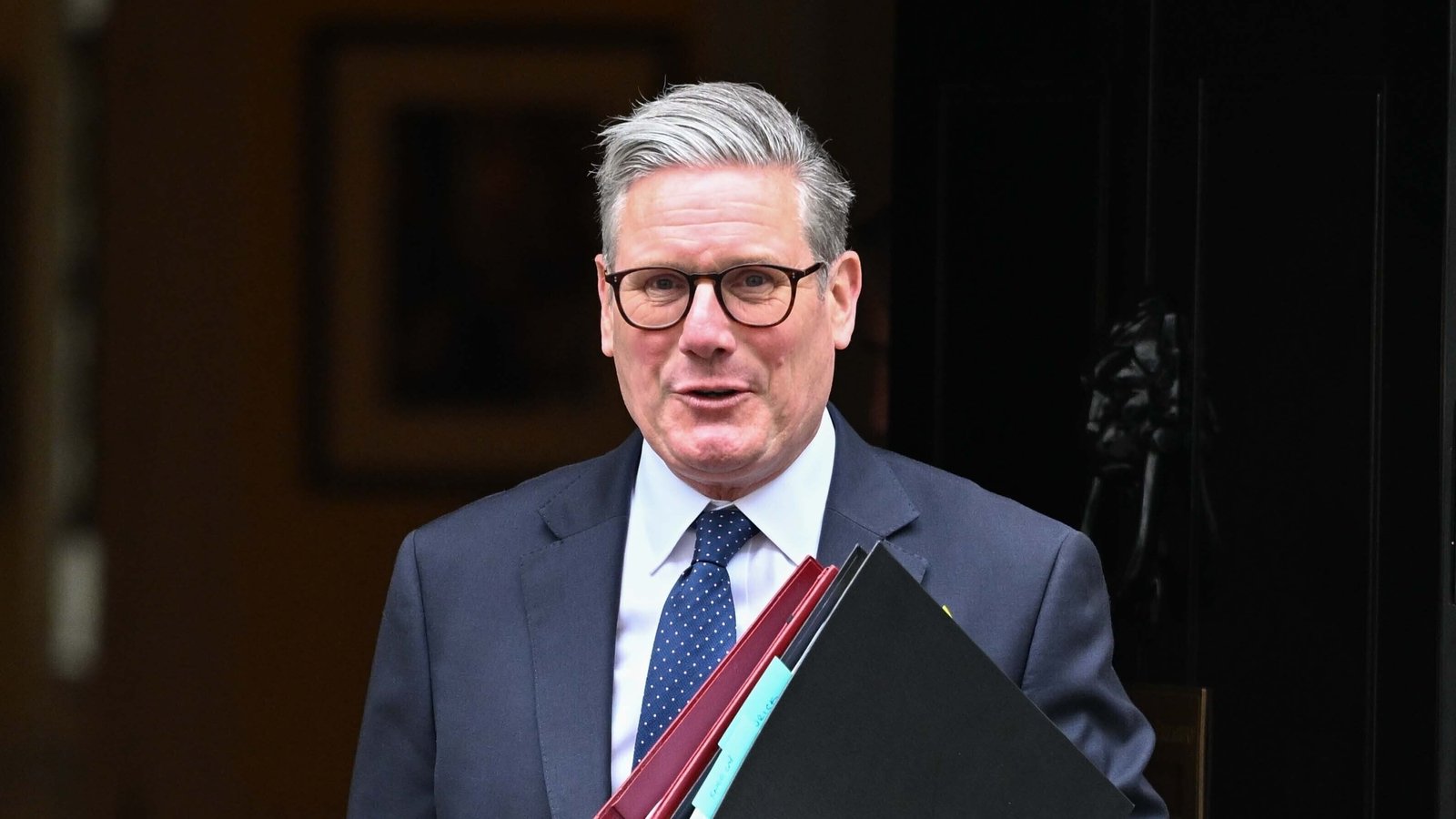
This post was originally published on this site.
The Conservative Party has called for an investigation into the Downing Street chief of staff, Morgan McSweeney, claiming he sought to mislead a UK election watchdog.
Mr McSweeney, a native of Macroom, Co Cork, has served in his current role since October last year.
While in opposition, he led a think-tank known as Labour Together, which is credited with helping the party prepare for its ultimate general election success in July 2024.
However, in 2021, it was fined £14,250 (€16,323) by the UK’s Electoral Commission over its handling of almost £740,000 in donations.
The Conservative Party has published correspondence which suggests that Mr McSweeney was advised to describe the failure to declare the donations as an “admin error”.
It has been met with criticism by many senior Labour figures, with the Deputy Prime Minister David Lammy describing the controversy as “muck-racking”.
Labour Together has also insisted that the issue has been dealt with.
“The Electoral Commission’s investigation, with which Labour Together fully co-operated, was completed in 2021. The outcome was made public and widely covered by the media at the time”, it said in a statement.
Pat McFadden, the Secretary of State for Work and Pensions, told BBC Radio this morning that the Conservative Party was trying to “attack somebody who is very effective”.
He described Mr McSweeney as an “integral part of Labour’s general election campaign”.
The Conservative Party is also calling for an investigation into Prime Minister Keir Starmer, claiming he failed to declare support from the think-tank Labour Together.
Downing Street has insisted that everything was properly declared.
Conservative Party chair Kevin Hollinrake claimed that Mr Starmer received help from Labour Together, which included “secret polling to help writing his speeches and behind the scenes campaigning”.
The party has written to the Parliamentary Standards Commissioner.
Breaking News
Police used journalists’ phone data to detect leaks by staff, report says
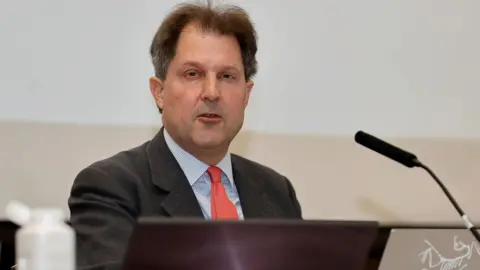
Read more on post.
Julian O’NeillBBC News NI crime and justice correspondent
Concerns have been raised over how the Police Service of Northern Ireland (PSNI) used journalists’ phone numbers to check for any leaks of information by its officers or staff.
A 200-page report also revealed there were 21 unlawful uses of covert powers to attempt to uncover reporters’ sources – double the figure previously disclosed.
Its author, lawyer Angus McCullough KC, said he found that the PSNI’s surveillance of journalists and lawyers is not “widespread or systemic”.
PSNI Chief Constable Jon Boutcher said the report “rightfully highlights that we have to improve our processes, and we will”.
Mr Boutcher added that he was “pleased” that the review did not identify systemic surveillance, but did find “individual authorisations where we as a police service could have done better”.
In the report, Mr McCullough was critical of “particular instances” and “some areas of practice”.
The report covered PSNI surveillance practices between 2011 and 2024.
Last year, Mr McCullough was asked to carry out an independent review by Mr Boutcher.
It followed legal action by journalists Barry McCaffrey and Trevor Birney and allegations that other journalists, and lawyers, might have had their phones monitored.
The PSNI previously admitted 10 attempts to use the communications data of journalists to try to identify their sources.
But the report found 21 instances, all pre-2015, which are “considered unlawful” and which relate to eight journalists, including Mr McCaffrey.
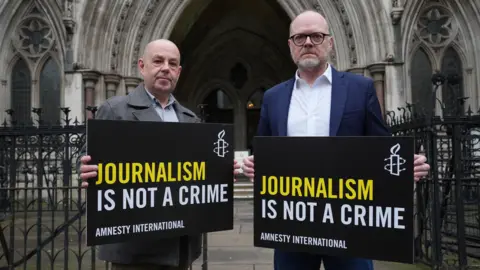 PA Media
PA MediaIn 2017, Mr Birney and Mr McCaffrey produced a documentary about the loyalist murders of six Catholic men as they watched a football match in a pub in Loughinisland in County Down in 1994.
No Stone Unturned was made by Belfast-based production company, Fine Point Films and directed by Oscar winner, Alex Gibney.
It examined how the Royal Ulster Constabulary (RUC) handled the case and made use of confidential documents from the Police Ombudsman for Northern Ireland (PONI) – a watchdog which investigates police conduct.
The PSNI treated the leak of PONI documents as theft.
A year later the two journalists were arrested.
They said their arrests were “an attack on the press” and challenged the way they were treated in court, winning substantial damages amounting to £875,000.
However, through legal disclosure material surfaced which revealed details of surveillance against them and other journalists.
Speaking on BBC Radio Ulster’s Talkback programme, Mr McCaffrey called for a public inquiry.
He said this would allow Northern Ireland Secretary Hilary Benn to “put the public confidence back in policing”.
Mr Birney welcomed the report but said his and Mr McCaffrey’s lawyers had not had a chance to “cross-examine the PSNI” and “review those documents… and test them against the law”.
Freedom of expression
Speaking at the report’s launch, Mr McCullough said there had been concerns of the effect the arrests could have on investigative journalism in Northern Ireland.
“Two journalists who had been investigating mass murder and allegations of state collusion had been arrested and subject to covert measures and surveillance of a suspected source”, the barrister said.
“The right of freedom of expression – including the freedom for journalists and civil society to examine the actions of the state – is fundamental to democracy.”
‘Lack of awareness’
The report also raised issues around the use of journalists’ phone numbers, which had been provided to the PSNI’s press office.
Between 2011 and 2023, the numbers were “washed through” police systems to detect any unauthorised contact between PSNI officers or staff and journalists.
This was referred to as pro-active “defensive operations” against leaks.
At one point, in 2011, it involved checking 65,000 calls against 383 journalists’ numbers.
The report states: “No legal advice appears to have been sought in relation to the legality or propriety of the practice.
“There seems to have been a lack of awareness until very recently that it might give rise to issues in relation to data protection and the rights of those whose data was being used unknowingly.
“This practice does not appear to have been necessary or proportionate.
“The scale and duration of defensive operations is a significant concern.”
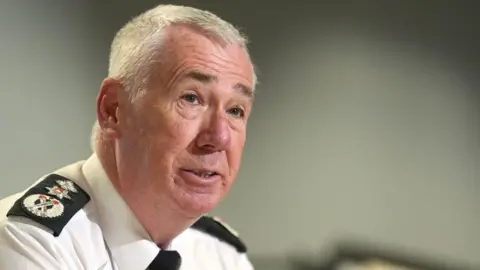 PA Media
PA MediaMr McCullough said the PSNI should consider self-reporting the matter to the UK’s data protection watchdog, the information commissioner.
He noted the practice was only formally discontinued in May of last year.
Investigative journalist Donal MacIntyre is named in the report as having been the subject of directed surveillance following posts he made on social media.
He is working on a documentary about the disappearance and death of schoolboy Noah Donohoe.
There was an unease that the X posts “created a serious risk of prejudice” to upcoming inquest proceedings.
Mr McCullough said he is concerned about the process that led to the surveillance being authorised, but added he found “no indication” that Mr MacIntyre’s private communications with Noah’s mother had been accessed.
Mr McIntyre said he was “shocked at the lackadaisical and lamentable processes that led the PSNI to authorise covert surveillance of [his] social media accounts”.
He said he was “relieved” that the review found his communications with Noah’s mother were not accessed.
However, he added that the findings exposed “profound institutional failings in the PSNI’s approach to covert surveillance” and raised “grave concerns” about the intrusion into his work and “the wider and potentially unchecked use of these powers in Northern Ireland”.
The report also found two instances of directed surveillance against an unnamed lawyer, including in a court building, without proper authorisation.
Mr McCullough did not examine any cases currently at the Investigatory Powers Tribunal, including MI5-conducted phone surveillance of journalist Vincent Kearney while he worked at the BBC.
‘Appropriate use of powers’
Mr Boutcher said that “properly exercised covert powers” had “an important role to play” in detecting, investigating, prosecuting and preventing crime.
“Mr McCullough makes reference to being struck by the utility of these powers in keeping the public better protected from a range of threats including organised crime, terrorism, paedophile rings and large scale drug supply,” he said.
Mr Boutcher said that “appropriate, lawful and proportionate use of these powers” keeps people safe and “builds confidence in policing”.
-
Breaking News1 day ago
Barack Obama to be conferred with freedom of Dublin at ceremony on Thursday
-
Breaking News1 day ago
Opinion: To be or not to be? Why it is time to drop Shakespeare’s compulsory status in Leaving Cert
-
Culture1 day ago
Taylor Swift’s new cinema outing generates more than €12million in just 24 hours
-
Breaking News1 day ago
Minister rejects proposal to make Shakespeare optional in Leaving Cert English
-
Breaking News1 day ago
Families at risk of homelessness may have another chance to avail of tenant-in-situ scheme
-
Travel & Lifestyle2 days ago
The Best Way to See Rome? On a Running Tour at Sunrise
-
Business21 hours ago
JLR shutdown extended again as ministers meet suppliers
-
Politics1 day ago
European Parliament snubs Orbán with vote to shield Italian MEP from Hungarian arrest


